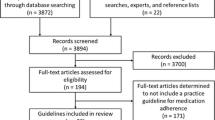Abstract
Poor adherence to medical therapy may cause as much as $100 billion in unnecessary healthcare expenses each year. Nonadherence is a complicated and dynamic problem that involves patient, medication, and prescriber factors. The Case Management Adherence Guidelines (CMAG-1) are an evidence-based algorithm that introduces concepts and strategies for assessing medical knowledge and readiness to change (motivational interviewing). Once the assessment has been made, the guidelines can be used regularly to help patients become and remain adherent to their medication regimens. CMAG-1 and its tools, based on up-to-date information about adherence and ways to promote behavioral change, are designed to identify motivational and knowledge deficiencies that may block adherence. As information accumulates from centers that use it, CMAG-1 will be modified accordingly, with the goal of creating structured interaction with patients that will increase their knowledge and motivation to take medication appropriately.
Similar content being viewed by others
References
Miller NH, Hill M, Kottke T, Ockene IS, for the Expert Panel on Compliance. The multilevel compliance challenge: recommendations for a call to action.Circulation. 1997;95:1085–1090.
Coons SJ. Medication compliance: the search for answers continues [editorial].Clin Ther. 2001;23:1294–1295.
Vermeire E, Hearnshaw H, Van Royen P, Denekens J. Patient adherence to treatment: three decades of research. A comprehensive review.J Clin Pharm Ther. 2001;26:331–342.
Podell RN, Gary LR. Compliance: a problem in medical management.Am Fam Physician. 1976; 13:74–80.
Zimmerman GL, Olsen CG, Bosworth MF. A ‘stages of change’ approach to helping patients change behavior.Am Fam Physician. 2000:61:1409–1416.
TEC Assessment Program.Special Report. Interventions to Improve Patient Adherence With Medications for Chronic Cardiovascular Disorders. Chicago, Ill: Blue Cross and Blue Shield Association; 2003.
Wilson JF. The crucial link between literacy and health.Ann Intern Med. 2003;139:875–878.
Chesney M. Adherence to HAART regimens.AIDS Patient Care STDS. 2003;17:169–177.
Coleman VR. Physician behaviour and compliance.J Hypertens Suppl. 1985;3:S69-S71.
Roter DL, Hall JA, Merisca R, Nordstrom B, Cretin D, Svarstad B. Effectiveness of interventions to improve patient compliance: a meta-analysis.Med Care. 1998;36:1138–1161.
Vik SA, Maxwell CJ, Hogan DB. Measurement, correlates, and health outcomes of medication adherence among seniors.Ann Pharmacother. 2004;38:303–312.
Adherence to Long-Term Therapies.Evidence for Action. Geneva, Switzerland: World Health Organization; 2003.
Prochaska JO, DiClemente CC, Norcross JC. In search of how people change. Applications to addictive behaviors.Am Psychol. 1992;47:1102–1114.
Morisky DE, Levine DM, Green LW, Shapiro S, Russell RP, Smith CR. Five-year blood pressure control and mortality following health education for hypertensive patients.Am J Public Health. 1983;73:153–162.
Bass PF III, Wilson JF, Griffith CH. A shortened instrument for literacy screening.J Gen Intern Med. 2003;18:1036–1038.
Ammassari A, Trotta MP, Murri R, et al. Correlates and predictors of adherence to highly active antiretroviral therapy: overview of published literature.J Acquir Immune Defic Syndr. 2002; 31 (suppl 3):S123-S127.
Broadhead WE, Gehlbach SH, de Gruy FV, Kaplan BH. The Duke-UNC Functional Social Support Questionnaire: measurement of social support in family medicine patients.Med Care. 1988;26:709–723.
Miller RH, Rollnick S.Motivational Interviewing: Preparing People for Change. 2nd ed. New York, NY: Guilford Press; 2002.
Stewart RB, Caranasos GJ. Medication compliance in the elderly.Med Clin North Am. 1989;73: 1551–1563.
Cline CMJ, Björck-Linné AK, Israelsson BYA, Willenheimer RB, Erhardt LR. Non-compliance and knowledge of prescribed medication in elderly patients with heart failure.Eur J Heart Fail. 1999;1:145–149.
Barat I, Andreasen F, Damsgaard EMS. Drug therapy in the elderly: what doctors believe and patients actually do.Br J Clin Pharmacol. 2001;51:615–622.
Wood W, Gray J. An integrative review of patient medication compliance from 1990–1998.Online J Knowl Synthesis Nurs. 2000;7:1–11.
Drug Therapy Considerations in Older Adults; VII. Sacramento, Calif: California State Board of Pharmacy; 2003.
Divertie V. Strategies to promote medication adherence in children with asthma. MCNAm J Matern Child Nurs. 2002;27:10–18.
Hoffman RP. Adolescent adherence in type 1 diabetes.Compr Ther. 2002;28:128–133.
Steele RG, Grauer D. Adherence to antiretroviral therapy for pediatric HIV infection: review of the literature and recommendations for research.Clin Child Fam Psychol Rev. 2003;6:17–30.
Tebbi CK. Treatment compliance in childhood and adolescence.Cancer. 1993;71:3441–3449.
Zilberman ML, Tavares H, Blume SB, el-Guebaly N. Substance use disorders: sex differences and psychiatric comorbidities.Can J Psychiatry. 2003;48:5–13.
Kushel MB, Vittinghoff E, Haas JS. Factors associated with the health care utilization of homeless persons.JAMA. 2001;285:200–206.
Neff JA, Zule WA. Predictive validity of a measure of treatment readiness for out-of-treatment drug users: enhancing prediction beyond demographic and drug history variables.Am J Drug Alcohol Abuse. 2002;28:147–169.
Carter S, Taylor D, Levenson R.A Question of Choice—Compliance in Medicine Taking. A Preliminary Review. London, England: University of London School of Pharmacy; 2004.
Charles H, Good CB, Hanusa BH, Chang C-C-H, Whittle J. Racial differences in adherence to cardiac medications.J Natl Med Assoc. 2003;95:17–27.
Lucas GM, Cheever LW, Chaisson RE, Moore RD. Detrimental effects of continued illicit drug use on the treatment of HIV-1 infection.J Acquir Immune Defic Syndr. 2001;27:251–259.
Opolka JL, Rascati KL, Brown CM, Gibson PJ. Role of ethnicity in predicting antipsychotic medication adherence.Ann Pharmacother. 2003;37:625–630.
de Groot M, Welch G, Buckland GT 3rd, Fergus M, Ruggiero L, Chipki SR. Cultural orientation and diabetes self-care in low-income African Americans with type 2 diabetes mellitus.Ethn Dis. 2003;13:6–14.
Kalichman SC, Catz S, Ramachandran B. Barriers to HIV/AIDS treatment and treatment adherence among African-American adults with disadvantaged education.J Natl Med Assoc. 1999; 91:439–446.
Collins KS, Tenney K, Hughes DL. Quality of health care for African Americans. Findings from the Commonwealth Fund 2001 Health Care Quality Survey. Available at: http://www.cmwf.org/ programs/minority/collins_africanamerican_fs_524.pdf. Accessed on August 20, 2004.
Auslander WF, Thompson S, Dreitzer D, White NH, Santiago JV. Disparity in glycemic control and adherence between African-American and Caucasian youths with diabetes. Family and community contexts.Diabetes Care. 1997;20:1569–1575.
Francis CK. Hypertension, cardiac disease, and compliance in minority patients.Am J Med. 1991; 91(suppl 1A):29S-36S.
Risser AL, Mazur LJ. Use of folk remedies in a Hispanic population.Arch Pediatr Adolesc Med. 1995;149:978–981.
Murphy DA, Roberts KJ, Hoffman D, Molina A, Lu MC. Barriers and successful strategies to antiretroviral adherence among HIV-infected monolingual Spanish-speaking patients.AIDS Care. 2003;15:217–230.
Lasater L, Mehler PS. The illiterate patient: screening and management.Hosp Pract. 1998;33: 163–165, 169–170.
Nichols-English G, Poirier S. Optimizing adherence to pharmaceutical care plans.J Am Pharm Assoc. 2000;40:475–485.
Paterson DL, Swindells S, Mohr J, et al. Adherence to protease inhibitor therapy and outcomes in patients with HIV infection.Ann Intern Med. 2000;133:21–30.
Golin CE, Liu H, Hays RD, et al. A prospective study of predictors of adherence to combination antiretroviral medication.J Gen Intern Med. 2002;17:756–765.
Nosé M, Barbui C, Tansella M. How often do patients with psychosis fail to adhere to treatment programmes? A systematic review.Psychol Med. 2003;33:1149–1160.
Pampallona S, Bollini P, Tibaldi G, Kupelnick B, Munizza C. Patient adherence in the treatment of depression.Br J Psychiatry. 2002;180:104–109.
Cheever LW. Adherence to HIV therapies. Available at: http://hab.hrsa.gov/publications/ chapter5/chapter5.htm. Accessed on August 20, 2004.
Author information
Authors and Affiliations
Rights and permissions
About this article
Cite this article
Aliotta, S.L., Vlasnik, J.J. & DeLor, B. Enhancing adherence to long-term medical therapy: A new approach to assessing and treating patients. Adv Therapy 21, 214–231 (2004). https://doi.org/10.1007/BF02850154
Issue Date:
DOI: https://doi.org/10.1007/BF02850154




